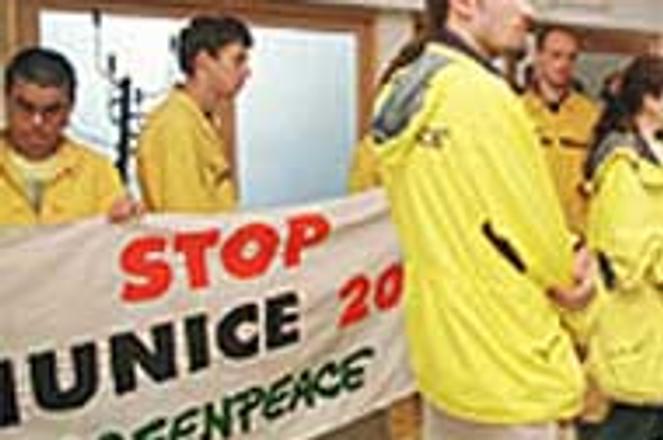Greenpeace activists have joined Austria in calling for Slovakia's aging Jaslovské Bohunice nuclear plant to be closed in 2000.photo: TASR
Slovakia announced on September 28 that it would be shutting down two nuclear blocks at its Jaslovské Bohunice plant in 2006 and 2008, earlier than originally planned. The move came after weeks of pressure on the government from non-nuclear Austria, which had threatened to block Slovakia's EU aspirations unless the aging reactors were shut down ahead of schedule.
Slovak Deputy Foreign Minister Ján Figeĺ made the announcement before the European Commission (EC) in Brussels, which accepted the decision. "The Slovak cabinet has set a deadline for the closure of the [nuclear] blocks that is in advance of their lifespans. In other words, we fulfilled the EC's demands, and the commission praised this gesture," said František Šebej, the head of the Slovak Parliamentary Committee for EU Integration.
The EC had also requested that Slovakia shut the V1 and V2 reactor blocks at Jaslovské Bohunice before 2010, the date the government had suggested last April. The commission had decided that Bohunice could not be upgraded to the required safety level at a reasonable cost.
According to EU Commissioner Gunter Verheugen, loans may now be immediately released by EU agencies like Euratom and PHARE to defray the costs of decommissiong the plant. Figel estimated that support from PHARE alone could hit 20 million euros annually. The EC has also promised to help Slovakia secure additional sources of money.
Despite the EC's approval, however, Austrian Chancellor Viktor Klima was displeased that Slovakia had not agreed to shut down Bohunice next year, as his government had expected. "This is unacceptable for Austria, Slovakia broke its word," he said after an Austrian government meeting on September 28, referring to a promise Slovakia made in 1994 to shut the Russian-designed reactors by the year 2000.
Construction began on the V1 Bohunice reactor block in 1972. V1 contains two reactors, Soviet-style VVER 440/V230 models, one of which came on line in 1978 and the other in 1980. Upgrades were done on both reactors from 1991 to 1993, and have been continuous since 1996.
The V2 reactor block also contains two reactors, but of a more modern design - the VVER 440/V213 model, a generation newer and safer than the V1 reactors. The first V2 reactor was turned on in 1984, and the second in 1985. Bohunice also contains a third reactor block - the A1 - which was closed last decade after two accidents.
The short-lived 1994 government of Jozef Moravčík promised that the Bohunice plant would be closed altogether when the first two blocks of Slovakia's second nuclear plant, Mochovce, were activated. Although Mochovce's second block is now to be activated next spring, the current government ruled in April that the country could not afford to close Bohunice early because the plant generates energy for about half the cost as at Mochovce.
"We have warned our European partners and the Slovak government that this decision is not in keeping with our agreement, and this question must be looked after immediately," warned Klima in the wake of the new Slovak stance.
Playing to the gallery
Austrian voters go to the polls nationwide on October 3, and some analysts have ascribed the hardline stance taken on Bohunice by Austrian politicians to the coming elections. The Austrian public is fiercely anti-nuclear.
Lubo Fuzak, an analyst with the Austrian APA news agency, told the Slovak daily paper Sme that Klima's negative reaction could have been predicted. "If someone comes and tells you this kind of thing a few days before elections, he shouldn't be surprised at the reaction," Fuzak said. "It's as natural as 'amen' in church."
Fuzak also blamed the Slovak government for mishandling the Bohunice issue and inflaming feelings on all sides. The government had actually decided when to close the reactors on September 14, but had delayed making the decision public for two weeks.
Foreign Minister Eduard Kukan then broke the news to Austrian Foreign Minister Benita Ferrera-Waldner at the UN General Assembly in New York, touching off a week of criticism from Austrian politicians to which the Slovak government could not respond, having not officially released its decision.
Slovak Deputy Prime Minister for European Integration Pavol Hamžík finally lashed out on September 24, noting that Austrian politicians had always criticised Bohunice but had never actually offered to help shut the plant down. "There is only unacceptable pressure which is counterproductive in relation to supporting Slovakia's EU entry," he said. If Slovakia were accepted into the EU, Hamžík said, it would be willing to discuss shutting down the reactors sooner. "However, in that case we would have to talk about compensation," he said.
Hamzik asked Austria's chief diplomat, Wolfgang Schussel, to meet him for discussions, but Schussel refused, citing election campaign business. "I understood this as a negative signal because it was a chance to explain things," Hamžík said.
Whether or not Austria follows through on its threat to block Slovakia's accession to the EU this December at the Helsinki summit depends on whether the union will vote on the futures of all non-member countries at once, or one at a time - in which case an Austrian veto could be deadly to Slovakia's chances.
"We have always said that no country can accede to the EU if it has danegrous nuclear reactors," said Klima on September 28. "That's for absolute sure."
Slovakia's Šebej, however, said that the Austrians were being unjustly harsh on his country, and misusing their influence in the EU to satisfy domestic aims. "Political pressure on Slovakia from the Austrian side is rather unfair," he said. "The fact that a nuclear facility which is not even in Austria would be the theme of an election campaign is a rather strange phenomenon of European politics."



